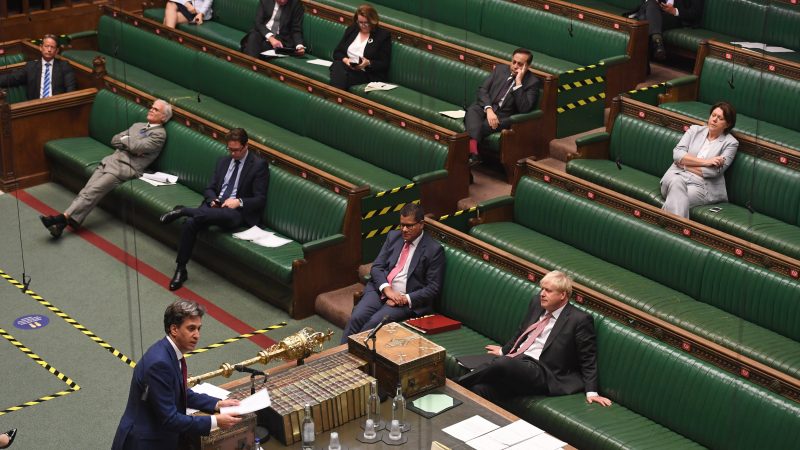
Ed Miliband has set out five demands to ‘keep 1.5 degrees alive’, including calling on the government to mandate 1.5 degree-aligned transition plans for financial institutions and major companies ahead of COP26, set to take place next month.
In a speech to the Green Alliance this afternoon, the Shadow Business, Energy and Industrial Strategy Secretary described the coming weeks as “the most important few weeks of this nation’s history in the fight against the climate crisis”.
“I am here today to talk about COP26, the most consequential summit that has ever taken place about the most consequential issue facing our world, which will open in Glasgow in barely a fortnight’s time,” he told those watching.
Miliband said there is a “chasm between government intentions and delivery” on climate action caused by a lack of investment, and said this was “reckless” and “irresponsible”. Labour’s five demands of the government are:
- “Leading by example, with climate action at home, by investing £28bn every year until 2030 to tackle the climate crisis, and creating secure jobs in the UK;
- “Support for developing countries through reversing the overseas aid cut, delivering and surpassing the $100 billion pledge for countries to cut emissions and adapt to climate change and vaccinating the world’s poorest;
- “Pressuring the big emitting nations, phasing out fossil fuels, and ensuring a just transition for workers;
- “Protecting nature with a robust net-zero and nature test for all government spending; and
- “Mobilising private finance behind climate action by requiring financial institutions and FTSE100 companies to publish their carbon footprint and adopt credible 1.5 degree-aligned transition plans.”
Miliband argued that the fifth demand, to mobilise private finance behind climate action, would be a “game-changer” as the UK is a major global financial centre, presenting the opportunity to “mobilise the trillions of pounds of private finance in pursuit of the ambitions of the Paris agreement”.
“The biggest single decision we can make as a country is to mobilise our world-leading global financial centre behind climate action equal to the scale of the emergency,” the Shadow Business, Energy and Industrial Strategy Secretary said.
“We need to match billions of investment from government in climate action with trillions in private sector finance. This proposal would be a game-changer in the fight against climate breakdown.
“It would set the global standard and make the UK the green finance capital of the world. And it would offer huge opportunities for our companies and investors and ensure that we manage the transition properly and act in this decisive decade.”
The investments of financial institutions based in the City of London account for approximately 15% of global emissions. Research by Greenpeace and WWF found that in 2019 the portfolios of the 15 largest banks and ten largest asset managers headquartered in the UK emitted almost double the UK’s entire annual emissions.
Their estimated carbon emissions amounted to 805 million tonnes CO2e, based on year-end disclosures from 2019. This is almost 1.8 times the UK’s domestically produced emissions, and larger than Germany’s 776 million tonnes CO2e.
His speech to the Green Alliance comes just weeks before world leaders gather in Glasgow for the UN’s annual climate change conference, this year being hosted by the UK. Alok Sharma is the COP26 president for the UK.
A report published earlier this summer, which is the culmination of 14,000 separate studies and the first major review of climate change from the UN’s intergovernmental panel on climate change since 2013, stated that it is “unequivocal that human influence has warmed the atmosphere, oceans and land”.
The report set out five scenarios for the future of climate change with varying degrees of severity projected, but all scenarios predicted that the 1.5˚C increase will be reached by 2040 and sooner if emissions are not reduced.
Labour leader Keir Starmer called for the Prime Minister to take urgent action following its publication, warning that the “the biggest threat we now face is not climate denial but climate delay”.
He recommitted the Labour Party to achieving the “substantial majority” of greenhouse gas emission cuts by 2030 during an interview with The Independent earlier this year, a pledge made by previous leader Jeremy Corbyn.
Labour set out a plan for a drive towards a clean economy focusing on the UK manufacturing sector last November, calling for a rapid stimulus package of at least £30bn over the next 18 months with dedicated funding to low-carbon industries.
Rachel Reeves announced at the annual Labour Party conference last month that the party in government would invest £28bn of capital investment towards the transition to a green economy for each year of this decade.
The Shadow Chancellor warned that delaying in tackling climate breakdown would be the “greatest cost to public finances, as well as to our planet”, and told conference that she would not “shirk our responsibility to future generations”.
“I will be a responsible Chancellor. I will be Britain’s first green Chancellor. Conference that is what a Labour government will do,” she declared.




More from LabourList
Nudification apps facilitate digital sexual assault – and they should be banned
Diane Abbott suspended from Labour after defending racism comments
Labour campaign groups join forces to call for reinstatement of MPs